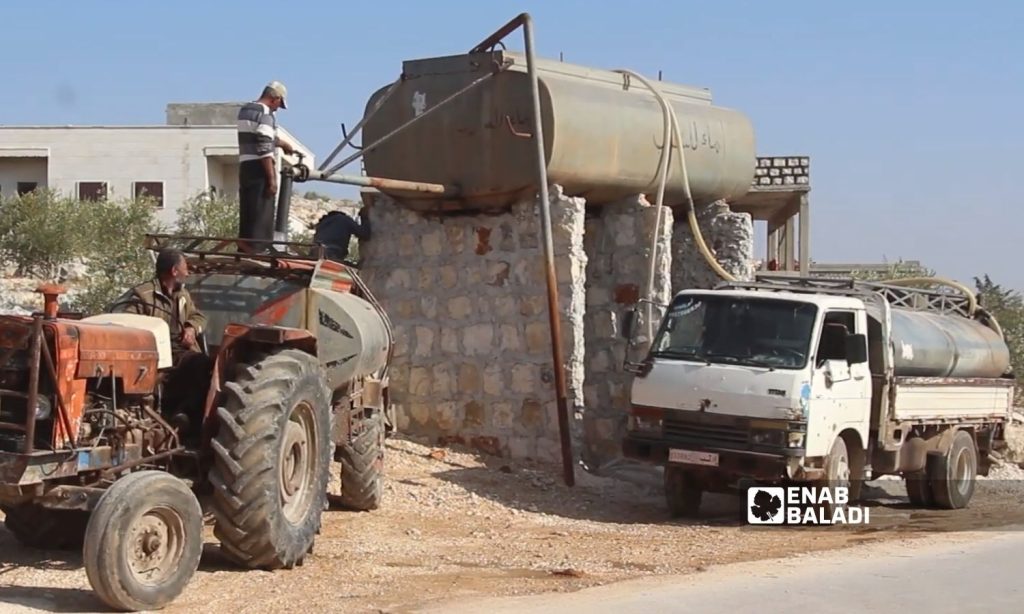Enab Baladi – Iyad Abdul Jawad
The Goal humanitarian organization announced that the water pumping stations in dozens of villages in northern Idlib governorate had stopped due to the halt of funding on 30 October.
The local organization’s statement said the water program it supports in 11 water stations and feeds more than 40 villages and towns in Idlib governorate has stopped working due to the fund suspension.
The alternatives for the residents are very difficult due to the deteriorating economic conditions in the region and the interruption of water from the main lines that have fed it for a few years.
Abdullah Onbashi, head of the local council of Qurqania village, told Enab Baladi that the “memorandum of understanding” signed by the council with the Goal organization to supply water to the area expired on 31 October.
Onbashi pointed out that “Goal” made promises to re-supply the area with water within a maximum period of two weeks, while work has not resumed despite the passage of 15 days since the water was cut off.
The northern region is facing a water shortage, coinciding with the lack of alternatives by service departments or residents.
A water tanker in the village of Qurqania in Idlib countryside – 17 November 2022 (Enab Baladi/Iyad Abdul Jawad)
No alternative plans
Onbashi told Enab Baladi that the council does not have any alternative plan to solve the water shortage problem in the future, given the weakness of financial resources.
“The council’s funding barely suffices the wages of the employees, especially the cleaners, as the council does not have the ability to operate a water station that needs large quantities of fuel,” he added.
The cost of operating it touches 1,500 US dollars per month if it is run on fuel only, while the cost of electrically operated equals 750 US dollars, according to the head of the council.
The high operating costs of these stations are due to the depth of the well, which is about 500 meters, two kilometers from the village of Qurqania.
As a temporary solution, the local council resorted to relying on three privately owned water pumps located in the village, from which water is transported to the people at prices that residents describe as high, Onbashi said.
Water from these pumps is transported in tanks to consumers, and the price of one tank reaches 150 Turkish liras, while the family needs four tanks per month, according to Onbashi.
Qurqania village has a population of more than 16,000 people, while it houses a large number of displaced people.
There are IDP camps in its vicinity that were supplied with water by the Goal humanitarian organization, according to the local council.
Bread or water
Mohammad al-Masri, 60, of Qurqania, told Enab Baladi that drinking water is one of the basic needs of the village’s residents, especially that it is located in a remote mountainous area where job opportunities are not available.
According to al-Masri, the deteriorating living condition increases the suffering of the residents as a large part of them think about securing their daily sustenance, which makes it difficult for them to secure the price of tanker-loaded water.
“My family consumes a water tank within four days, and its price is about 130 Turkish liras, which is beyond the capacity of the residents and the displaced, as the daily wages of a worker do not exceed 20 Turkish liras in the area,” al-Masri told Enab Baladi.
Mustafa Ramadan, 50, an IDP from the southern countryside of Idlib and resides in Qurqania, told Enab Baladi that the water used to reach the village for free from the Goal organization and that its cut constitutes a great financial burden on the residents and the IDPs.
While the residents of Qurqania and the surrounding villages are preoccupied with the price of bread and basic necessities, the income from work, if any, barely covers the price of their bread, so water shortage is added to the list of their problems, Ramadan added.
Water tanker costs
Mohammad Haj Taha, the owner of a water tanker in Qurqania, told Enab Baladi that he is having difficulty transporting water to the village and its surroundings individually, and the houses lack suitable means to conserve water.
Haj Taha added that the lack of fuel, its high prices, and the difficulty of securing it contributed to raising the prices of water transportation.
The price of a water tank with a capacity of 5,000 liters reaches 140 Turkish liras, while most people do not have the price, as an individual needs to work 15 days to secure the price of one tanker, which is enough for a few days, according to Haj Taha.
For about two months, the northern region has been witnessing a fuel shortage and a price increase due to the entry of Hayat Tahrir al-Sham (HTS) into northern Aleppo countryside, which is controlled by the Turkish-backed Syrian National Army (SNA).
Northwestern regions suffer from a lack of support in various sectors, most notably education and medical care, while the recent period witnessed cuts in funds in the service sector.

